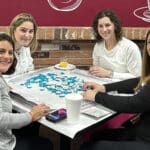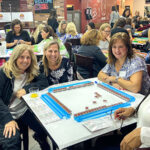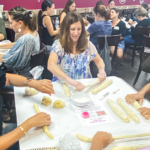
Dr. David Schonfeld, Director of the National Center for School Crisis and Bereavement at Children’s Hospital Los Angeles.
By Jill Fox
As the commemoration of the horrific mass shooting in Parkland approaches, local schools are holding a parent night to discuss how to support loved ones.
After visiting Parkland almost monthly since the shooting, Dr. David Schonfeld, Director of the National Center for School Crisis and Bereavement at Children’s Hospital Los Angeles, is returning for this critical discussion.
For over 30 years, Dr. Schonfeld has provided training to schools on supporting students and staff at times of crisis and loss, which included guiding Marjory Stoneman Douglas teachers on the first day back to class after the shooting.
“Families have had time to observe their children and how they’re doing and make adjustments,” he said. “I’m not expecting to give them a lot of technical information that they don’t know; I’m just giving them an opportunity to ask their questions.”
According to Schonfeld, the commemoration of such events can remind people of how they felt that day or of the loss more acutely.
Here is a list of things families should know before February 14.
1 Have sensitivity
One of the things parents have to recognize is if their children act differently and have concerns about things unrelated to the two-year mark.
2 Watch for signs
Dr. Schonfeld said, individuals who are under distress often act less mature. They may seem a little more self-centered, irritable, or inflexible. Children sometimes act like they do not recognize the seriousness of what the day represents, but it’s that they are, and that’s difficult for them.
3 Supervise your children
Dr. Schonfeld explained that schools decided to make February 14 a half-day to try and balance an appreciation of the effect that the day might have on the people most directly impacted, but also recognizing that schools need to be open for support and counseling.
“It’s really a time to be with family and friends,” he said, “Not a time for children to sit with upset feelings by themselves.”
In addition to being with a trusted adult who cares about them, Dr. Schonfeld said parents should make sure they’re providing support and a little more monitoring of their children on that day.
4 Ask questions
At Dr. Schonfeld’s gathering, he doesn’t plan on spending his time presenting content. His goal is to be available to answer questions and offer strategies to use to provide support.
5 It’s okay to worry
“For parents, the predominant concern that I hear voiced is, I’m worried,” said Schonfeld, “I’m worried that I’m not doing everything I can for my child, I’m worried that they’re still struggling, I’m worried that I’m still struggling.”
Schonfeld is hoping this will allow them to ask questions and get some of their concerns answered. He doesn’t aim to take away the distress that they have from these tragic events. He tries to minimize it, so they’re not worried about things they don’t have to be concerned about and don’t have to be distressed because by feeling insecure that they’re not doing the right thing.
6 Act “normal”
In the past, some parents have attended his presentations because their children are not exhibiting distress and they didn’t know if they could be missing something.
“Hopefully, I can help them by providing some conversation that will help them feel more confident that they’re doing the best by their child, their family, and themselves,” said Schonfeld.
Attend the meeting at Westglades
Parents who want to hear Dr. Schonfeld can join him at Westglades Middle School auditorium at 1100 Holmberg Road Thursday, February 13, between 4:30 p.m. and 6:30 p.m.
Author Profile

Related
 NewsDecember 10, 2024Join Others for Latkes, Vodka and Mah Jongg December 12
NewsDecember 10, 2024Join Others for Latkes, Vodka and Mah Jongg December 12 NewsNovember 25, 2023Celebrate Hanukkah with Mah Jongg, Latkes, and Vodka for a Good Cause
NewsNovember 25, 2023Celebrate Hanukkah with Mah Jongg, Latkes, and Vodka for a Good Cause NewsNovember 13, 2023Annual Pink Challah Bake and Mah Jongg Night to Benefit Jewish Women’s Health
NewsNovember 13, 2023Annual Pink Challah Bake and Mah Jongg Night to Benefit Jewish Women’s Health NewsJanuary 21, 2023Early Childhood Center Celebrates 20 Years in Parkland
NewsJanuary 21, 2023Early Childhood Center Celebrates 20 Years in Parkland









